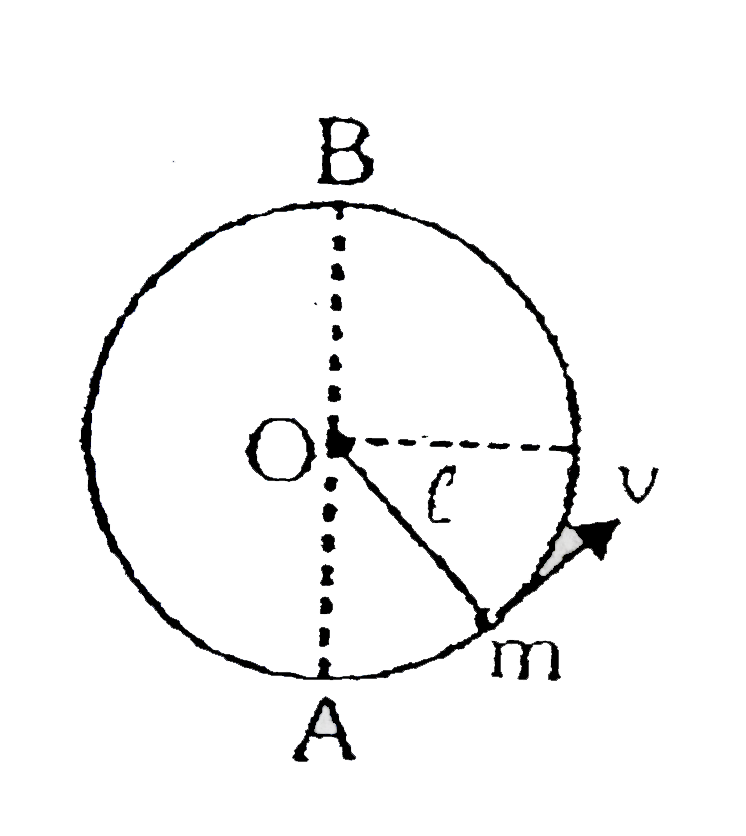A body is moving in a circular orbit. It is just about to slide to the outer side and μmg=mv2l. In this expression, μ represents
Coefficient of static friction
Coefficient of kinetic friction
Coefficient of rolling friction
None
The correct Answer is:A
Step by step video & image solution for A body is moving in a circular orbit. It is just about to slide to the outer side and mu mg =(mv^(2))/l. In this expression, mu represents by Physics experts to help you in doubts & scoring excellent marks in Class 12 exams.
Updated on:21/07/2023Topper's Solved these Questions
- LAWS OF MOTIONBOOK - AAKASH SERIESCHAPTER - LAWS OF MOTIONEXERCISE - EXERCISE - II
136 Videos
- LAWS OF MOTIONBOOK - AAKASH SERIESCHAPTER - LAWS OF MOTIONEXERCISE - PRACTICE EXERCISE
106 Videos
- LAWS OF MOTIONBOOK - AAKASH SERIESCHAPTER - LAWS OF MOTIONEXERCISE - Application
6 Videos
- GEOMETRICAL OPTICSBOOK - AAKASH SERIESCHAPTER - GEOMETRICAL OPTICSEXERCISE - ADDITIONAL PRACTICE EXERCISE (LEVEL-II PRACTICE SHEET (ADVANCED) INTEGER TYPE QUESTIONS)
10 Videos
- LOGIC GATESBOOK - AAKASH SERIESCHAPTER - LOGIC GATESEXERCISE - Exercise (Very Short Answer)
10 Videos
Similar Questions
A body of mass m is moving in a circular orbit of radius R about a planet of mass M. At some instant, it splits into two equal masses. The first mass moves in a circular orbit of radius R2. And the other mass, in a circular orbit of radius 3R2. The difference between the final and initial total energies is :
View SolutionA body is moving in a low circular orbit about a planet of mass M and radius R. The radius of the orbit can be taken to be R itself. Then the ratio of the speed of this body in the orbit to the escape velocity from the planet is :
View SolutionThe potential energy of a particle of mass ? at a distance ? from a fixed point ? is given by V(r)=kr2/2, where ? is a positive constant of appropriate dimensions. This particle is moving in a circular orbit of radius ? about the point ?. If ? is the speed of the particle and ? is the magnitude of its angular momentum about ?, which of the following statements is (are) true?
View SolutionA star like the sun has serveral bodies moving around it at different distance. Consider that all of them are moving in circular orbits. Let r be the distance of the body from the centre of the star and let its linear velocity be υ, angular velocity ω, kinetic energy K, gravitational potential energy U, total energy E and angular momentum L. As the radius r of the orbit increase, determine which of the above quantities increase and which ones decrease.
View SolutionAn electron is in a circular orbit about the nucleus of an atom. Find the ratio between the orbital magnetic dipole moment →μ and the angular momentum →L of the electron about the center of its orbit.
View SolutionA particle of charge -q and mass m moves in a circular orbit about a fixed charge +Q. Show that the r3αT2 law, is satisfied, where r is the radius of orbit and T is time period.
View SolutionA satellite of mass M is in a circular orbit of radius R about the centre of the earth. A meteorite of the same mass, falling towards the earth, collides with the satellite completely inelastically. The speeds of the satellite and the meteorite are the same, just before the collision. The subsequent motion of the combined body will be:
View SolutionA satellite of mass M is in a circular orbit of radius R about the centre of the earth. A meteorite of the same mass, falling towards the earth, collides with the satellite completely inelastically. The speeds of the satellite and the meteorite are the same, just before the collision. The subsequent motion of the combined body will be:
View SolutionA bob of mass m is attached at one end of a string of length l other end of the string is fixed at point O. Bob is rotating in a circular path of radius l in horizontal plane about O with constant speed v, as shown in the figure. The average force exterted by string on the bob during its :−

(A) half revolution will be mv2πl
(B) half revolution will be 2mv2πl
(C) one fourth revolution will be √2mv2πl
(D) one revolution will be zero
Select correct alternative :−
View SolutionA car of mass m is moving on a level circular track of radius R if μs represents the static friction between the road and tyres of the car, the maximum speed of the car in circular motion is given by.
View Solution
